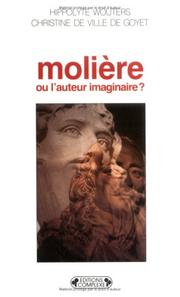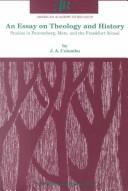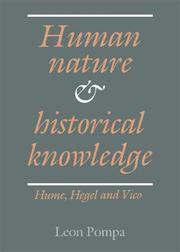| Listing 1 - 10 of 10 |
Sort by
|
Article
Abstract | Keywords | Export | Availability | Bookmark
 Loading...
Loading...Choose an application
- Reference Manager
- EndNote
- RefWorks (Direct export to RefWorks)
Article
Abstract | Keywords | Export | Availability | Bookmark
 Loading...
Loading...Choose an application
- Reference Manager
- EndNote
- RefWorks (Direct export to RefWorks)
Book
Year: 1990 Publisher: Bruxelles Luc-J. Dacosse
Abstract | Keywords | Export | Availability | Bookmark
 Loading...
Loading...Choose an application
- Reference Manager
- EndNote
- RefWorks (Direct export to RefWorks)
Book

Year: 1990 Publisher: New York : Parsons School of Design Gallery,
Abstract | Keywords | Export | Availability | Bookmark
 Loading...
Loading...Choose an application
- Reference Manager
- EndNote
- RefWorks (Direct export to RefWorks)
Harvey, Bessie --- Hauser, Johann --- Koczy, Rosemarie --- Louden, Albert --- Murry, J.B. --- Nedjar, Michel --- Schöpke, Philipp --- Verbena, Pascal

ISBN: 2870273436 9782870273432 Year: 1990 Publisher: Bruxelles: Complexe,
Abstract | Keywords | Export | Availability | Bookmark
 Loading...
Loading...Choose an application
- Reference Manager
- EndNote
- RefWorks (Direct export to RefWorks)
Cet ouvrage n'est pas scientifique : "Comme Molière est mort sans laisser ni la moindre lettre, ni le plus petit fragment de manuscrit d'une pièce, phénomène troublant mais non pas unique dans l'histoire de la littérature, les légendes ne manquent pas à son sujet. On connaît ainsi la thèse du vaste complot ourdi par ses ennemis dévots pour regrouper et détruire tous ses papiers personnels, ou encore celle d'Anatole Loquin, membre de l'Académie des Sciences, Belles-Lettres et Arts de Bordeaux, qui fait de Molière le Masque de Fer, dont il a fallu détruire les documents pour raison d'État. On connaît aussi le vieux serpent de mer selon lequel Molière, simple farceur quasi-inculte, ne serait pas l'auteur de ses œuvres et aurait utilisé les services d'un "nègre", Pierre Corneille lui-même, qui, pour sa part, avait le talent, la culture et surtout le temps nécessaire à la conception et à l'écriture d'une telle œuvre. C'est Pierre Louÿs, grand expert en supercherie littéraire - il avait fait croire à l'authenticité grecque de ses Chansons de Bilitis - qui présente cette idée comme une énigme ("Molière est un chef-d'œuvre de Corneille", Comedia, 7 novembre 1919), ouvrant ainsi la voie à quelques sporadiques publications ultérieures: Henry Poulaille (Corneille sous le masque de Molière, Grasset, 1957), Hippolyte Wouters et Christine de Ville de Goyet, deux avocats bruxellois (Molière ou l'auteur imaginaire, éd. Complexe, 1990), et enfin Dominique et Cyril Labbé (Journal of Quantitative Linguistics, vol. 8, n°3, décembre 2001). Sans entrer dans le détail d'une réfutation rigoureuse et définitive, faite récemment par de grands spécialistes tels que Georges Forestier, Patrick Dandrey, et Roger Duchêne (à ce sujet, voir les articles de Georges Forestier et Roger Duchêne), le simple bon sens, la connaissance du théâtre, celle des mœurs de l'époque ainsi que de l'histoire littéraire suffisent à balayer les arguments avancés par cette lignée d'"enquêteurs". Ainsi, pourquoi aucun des nombreux ennemis de Molière, contre lequel ils ont pourtant fait flèche de tout bois, n'a-t-il émis une telle hypothèse ? Pourquoi Molière n'aurait-il pas eu le temps matériel d'écrire ses œuvres, alors que ses contemporains étaient si prolixes (Alexandre Hardy auquel on prête quelque six cents œuvres)? Pourquoi le grand Corneille aurait-il accepté d'être un "nègre", alors qu'il n'avait pas, contrairement à une légende tenace, de difficultés d'argent. Quant aux approches récentes de linguistique quantitative de C. et D. Labbé, dont il faut dire un mot puisqu'elle revêtent un manteau de scientificité, elles conduisent à des non sens liés à une méconnaissance patente de la littérature du temps: leur méthode, utilisée de manière partielle, ne tient aucun compte en effet des spécificités du théâtre de l'époque, de l'histoire des formes littéraires, et surtout des pratiques d'écriture. Cette imprudence méthodologique les conduit à s'intéresser aux occurrences des mots, pour y relever des "signatures" ou des "empreintes digitales", alors que le vocabulaire ne constitue pas, pour le théâtre du XVIIe siècle, un critère pertinent: car les contraintes esthétiques et poétiques (la question des registres, la rigoureuse détermination des genres, et les règles de la métrique) sont telles qu'elles limitent nécessairement la "liberté d'expression" des auteurs telle que nous la concevons aujourd'hui en mettant à leur disposition un lexique relativement limité et fixé par une convention stabilisée. Elles contribuent ainsi à estomper leur personnalité propre, de sorte qu'on ressent légitimement une certaine uniformité à la lecture des millions d'alexandrins écrits à l'époque. Ainsi, les différences existant entre les auteurs ne tiennent pas au choix des mots, mais à leur disposition, et à la façon, propre à chacun, de rythmer le vers; d'ailleurs tout lecteur un tant soit peu sensible à l'écriture remarque rapidement que Corneille dispose d'une rythmique et d'une "respiration" qui lui sont propres. Il s'agit donc ici d'une question de rhétorique et non de lexique. À quand le prochain (faux) scoop? Laissons le mot de la fin, en le parodiant, à George Bernard Shaw qui raillait les tenants d'une thèse identique au sujet de Shakespeare: "Molière n'est pas l'auteur de ses œuvres. Celles-ci ont été écrites par un inconnu qui se nommait Molière» (© www.toutmoliere.net : page Sottisier)
Molière --- Franse letterkunde --- Littérature française --- Poquelin, J.-B. --- Molière, --- Authorship --- Art d'écrire --- French drama --- Authorship. --- Corneille, Pierre, --- Molière, --- Art d'écrire --- Criticism and interpretation --- French drama - 17th century - Authorship. --- Molière, Jean-Baptiste Poquelin dit --- Molière, - 1622-1673 - Authorship. --- Corneille, Pierre, - 1606-1684 - Authorship. --- Moliere (jean-baptiste poquelin, dit), 1622-1673 --- Molière, - 1622-1673 --- Corneille, Pierre, - 1606-1684 --- Corneille, Pierre
Book
ISBN: 0820411825 Year: 1990 Publisher: New York, N.Y. Lang
Abstract | Keywords | Export | Availability | Bookmark
 Loading...
Loading...Choose an application
- Reference Manager
- EndNote
- RefWorks (Direct export to RefWorks)
Comparative literature --- Hippolytus (Greek mythology) in literature --- Phaedra (Greek mythology) in literature --- Space and time in literature --- Theater --- Tragedy --- Drama --- Space and time as a theme in literature --- Literature, Comparative --- Philology --- French and Greek --- Greek and French --- History --- History and criticism --- Euripides. --- Racine, Jean, --- Racine, Jean --- Euripides --- Hoffmann, François Benoît, --- Lemoyne, J.-B.
Book
ISBN: 9034104192 Year: 1990 Publisher: Deurne MIM
Abstract | Keywords | Export | Availability | Bookmark
 Loading...
Loading...Choose an application
- Reference Manager
- EndNote
- RefWorks (Direct export to RefWorks)
Dit boek bespreekt de belangrijkste etappes in de geschiedenis van de economische theorie in het Westen. De gebruikelijke onderwerpen zoals waarde en prijs, arbeid en loon, kapitaal en winst, groei en ontwikkeling komen aan bod. Er wordt veel aandacht besteed aan methodologische en wetenschapsfilosofische vraagstukken, waarbij dieper wordt ingegaan op de economische theorieën van o.a. de fysiocraten, Adam Smith, T.R. Malthus, David Ricardo, J.B. Say, J.S. Mill, Karl Marx, Alfred Marshall, Keynes. Er wordt bewust minder aandacht geschonken aan de hedendaagse opvattingen over economie.
History --- Economic schools --- economische geschiedenis --- Methodology of economics --- economische systemen --- economisch denken --- 330.8 --- 330.1 --- 93 --- economische theorieën --- economen --- Adam Smith --- T.R. Malthus --- David Ricardo --- J.B. Say --- J.S. Mill --- Karl Marx --- Alfred Marshall --- John Maynard Keynes --- 340.7 --- Geschiedenis van het economisch denken (economisch denken en economische scholen, geschiedenis van de economie) --- 352 --- E080538.jpg --- Economie ; geschiedenis --- Economisch denken. Economische scholen. Economische theorieen --- Methodologie van de economie --- Economische leerstelsels --- Geschiedenis --- geschiedenis van de economie --- 330.8 Economisch denken. Economische scholen. Economische theorieen

ISBN: 155540541X Year: 1990 Volume: vol 61 Publisher: Atlanta, Ga. Scholars Press
Abstract | Keywords | Export | Availability | Bookmark
 Loading...
Loading...Choose an application
- Reference Manager
- EndNote
- RefWorks (Direct export to RefWorks)
2 PANNENBERG, WOLFHART --- 2 METZ, JOHANN BAPTIST --- 316.257 --- 234.35 --- Godsdienst. Theologie--PANNENBERG, WOLFHART --- Godsdienst. Theologie--METZ, JOHANN BAPTIST --- Frankfurter schule. Kritische sociologie. Kritische school binnen de sociologgie--(sociologische scholen) --- Werking van God in de geschiedenis. Historiciteit. Theologie van de geschiedenis --- 234.35 Werking van God in de geschiedenis. Historiciteit. Theologie van de geschiedenis --- 316.257 Frankfurter schule. Kritische sociologie. Kritische school binnen de sociologgie--(sociologische scholen) --- 2 METZ, JOHANN BAPTIST Godsdienst. Theologie--METZ, JOHANN BAPTIST --- 2 PANNENBERG, WOLFHART Godsdienst. Theologie--PANNENBERG, WOLFHART --- Critical theory --- Frankfurt school of sociology --- History --- Critical theory (Sociology) --- Frankfurt school --- Frankfurt sociologists --- Schools of sociology --- Marxian school of sociology --- Critical social theory --- Critical theory (Philosophy) --- Negative philosophy --- Criticism (Philosophy) --- Philosophy, Modern --- Rationalism --- Sociology --- Socialism --- Religious aspects --- Christianity --- History of doctrines --- Adorno, Theodor W., --- Horkheimer, Max, --- Metz, Johannes Baptist, --- Pannenberg, Wolfhart, --- Metz, J. B. --- Horḳhaimer, M. --- הורקהיימר, מקס --- 霍克海默尔, --- Хоркхаймер, Макс, --- Khorkkhaĭmer, Maks, --- Wiesengrund, Theodor, --- Wiesengrund-Adorno, Theodor, --- Adorno, Teodor V., --- Adorŭno, --- אדורנו, תאודור --- אדורנו, ת. ו. --- Adorno, Th. W. --- History (Theology) --- 20th century --- Adorno, Theodor Wiesengrund --- Metz, Johannes Baptist --- History (Theology) - History of doctrines - 20th century. --- Pannenberg, Wolfhart, 1928 --- -Horkheimer, Max, 1895-1973. --- Adorno, Theodor W., 1903-1969. --- Metz, Johannes Baptist, 1928 --- -History (Theology) --- -Critical theory --- Adorno, Theodor W. --- Metz, Johann Baptist, --- Metz, Johannes Baptist, 1928-

ISBN: 0521381371 9780521892209 9780511597930 9780521381376 0521892201 0511597932 Year: 1990 Publisher: Cambridge : Cambridge University Press,
Abstract | Keywords | Export | Availability | Bookmark
 Loading...
Loading...Choose an application
- Reference Manager
- EndNote
- RefWorks (Direct export to RefWorks)
This book presents a study of the nature and conditions of historical knowledge, conducted through a study of the relevant theories of Hume, Hegel and Vico. It is usually thought that in order to establish historical facts, we have to have a theory of human nature to support our arguments. Hume, Hegel and Vico all subscribed to this view, and are therefore discussed in detail. Professor Pompa goes on to argue that there is in fact no way of discovering anything about human nature except through historical investigation. It is necessary therefore to find a different way of thinking about how we discover historical facts. This is done in the last chapter where, in opposition to almost all present views, it is argued that we must have a framework of inherited knowledge before we can believe in anything which results from historical enquiry.
1 HUME, DAVID --- 1 HEGEL, GEORG WILHELM FRIEDRICH --- 1 VICO, GIAMBATTISTA --- History --- -Man --- Philosophical anthropology --- Human beings --- Homo sapiens --- Human race --- Humanity (Human beings) --- Humankind --- Humans --- Man --- Mankind --- People --- Hominids --- Persons --- Anthropology, Philosophical --- Man (Philosophy) --- Civilization --- Life --- Ontology --- Humanism --- Philosophy of mind --- Annals --- Auxiliary sciences of history --- 1 VICO, GIAMBATTISTA Filosofie. Psychologie--VICO, GIAMBATTISTA --- Filosofie. Psychologie--VICO, GIAMBATTISTA --- 1 HEGEL, GEORG WILHELM FRIEDRICH Filosofie. Psychologie--HEGEL, GEORG WILHELM FRIEDRICH --- Filosofie. Psychologie--HEGEL, GEORG WILHELM FRIEDRICH --- 1 HUME, DAVID Filosofie. Psychologie--HUME, DAVID --- Filosofie. Psychologie--HUME, DAVID --- Philosophy --- Hegel, Georg Wilhelm Friedrich --- Hume, David --- Vico, Giambattista --- Vico, J. B. --- ヒューム --- Hegel, Giorgio Guglielmo Frederico --- History, Modern --- Hegel, Georg Wilhelm Friedrich, --- Hume, David, --- Vico, Giambattista, --- Vico, G. --- Vico, G. B. --- Vico, Giovanni Battista, --- Vico, Juan Bautista, --- Pikʻo, --- Vico, Giovan Battista, --- ויקו, ג׳מבטיסטה, --- Weike, --- 维柯, --- Hegel, Georg Wilhelm Friedrich. --- Human beings. --- Hēgeru, --- Hei-ko-erh, --- Gegelʹ, Georg, --- Hījil, --- Khegel, --- Hegel, G. W. F. --- Hegel, --- Hei Ge Er, --- Chenkel, --- Hīghil, --- הגל, --- הגל, גאורג וילהלם פרידריך, --- הגל, גיאורג וילהלם פרידריך, --- הגל, ג.ו.פ, --- היגל, גורג ווילהלם פרדריך, --- היגל, גיורג וילהלם פרידריך, --- 黑格尔, --- Hegel, Guillermo Federico, --- Hegel, Jorge Guillermo Federico, --- Heyel, Georg Wilhelm Friedrich, --- Higil, Gʼūrg Vīlhim Frīdrīsh, --- هگل, --- هگل، گئورگ ويلهم فريدريش, --- Arts and Humanities --- Philosophical anthropology. --- Philosophy.
Book
ISBN: 3429012961 9783429012960 Year: 1990 Volume: 1 Publisher: Würzburg: Echter,
Abstract | Keywords | Export | Availability | Bookmark
 Loading...
Loading...Choose an application
- Reference Manager
- EndNote
- RefWorks (Direct export to RefWorks)
271-3 --- Liberation theology. --- Evangelical counsels --- -#gsdb10 --- Counsels, Evangelical --- Counsels of perfection --- Perfection, Counsels of --- Monastic and religious life --- Perfection --- Theology of liberation --- Theology, Doctrinal --- Kairos documents --- Philosophy of liberation --- 271-3 Religieuze geloften van armoede, kuisheid en gehoorzaamheid. Kern van het religieuze leven --- Religieuze geloften van armoede, kuisheid en gehoorzaamheid. Kern van het religieuze leven --- History of doctrines --- -Religious aspects --- Christianity --- -271-3 --- -Balthasar, Hans Urs von --- Rahner, Karl --- Metz, Johannes Baptist --- Contributions in interpretation of the evangelical counsels --- Contributions in interpretation of the evengelical counsels --- -Rahner, Karl --- -Metz, Johannes Baptist --- -Contributions in interpretation of the evangelical counsels --- Liberation theology --- #GGSB: Bijbel --- #GGSB: Geestelijke lezing (geel) --- #GGSB: Spiritualiteit --- #GROL:SEMI-248.145.4 --- Religious aspects --- Balthasar, Hans Urs von, --- Metz, Johannes Baptist, --- Rahner, Karl, --- Rahner, Carl, --- Rahner, Carolus, --- Ranŏ, Kʻal, --- Rāhnar, Kārl, --- Rahner, K. --- Rahner, Karl-Heinz, --- Metz, J. B. --- Balthasar, Hans Urs von --- Balthasar, H. U. von --- Von Balthasar, Hans Urs --- #gsdb10 --- von Balthasar, Hans Urs --- Metz, Johann Baptist, --- Bijbel --- Geestelijke lezing (geel) --- Spiritualiteit --- Evangelical counsels - History of doctrines - 20th century --- Balthasar, Hans Urs von - Contributions in interpretation of the evangelical counsels --- Rahner, Karl - Contributions in interpretation of the evengelical counsels --- Metz, Johannes Baptist - Contributions in interpretation of the evangelical counsels
| Listing 1 - 10 of 10 |
Sort by
|

 Search
Search Feedback
Feedback About UniCat
About UniCat  Help
Help News
News